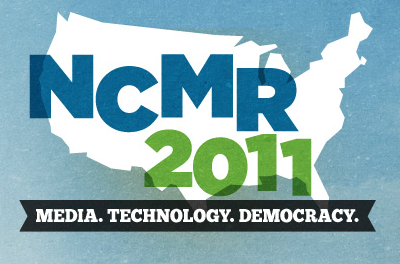This Weekend in Media Reform

While my colleagues Chris and Jared are in Nigeria, supporting the #biggestPVTever, I was up in Boston this weekend at the National Conference on Media Reform, an annual event dedicated to the convergence of trends in media, technology, and policy. This year brought roughly 2,500 attendees and a slew of prominent and interesting speakers.
I was on a panel called Mobile Democracy: Your Phone is Political, with Jed Alpert and Rachel LaBruyere from MobileCommons, a campaign strategy group, Josh Levy from Free Press, the organization behind NCMR, and our moderator Jamilah King from the racial justice action site ColorLines.Our panel was to address how mobile is being used in activism in the United States and abroad, and some of the policy implications domestically and internationally, ranging from FCC's Net Neutrality work to the State Department's efforts on Internet Freedom.
The discussion ranged from the micro to the macro, starting with the importance of the basic SMS. In the United States there are 300 million mobile phone subscriptions, and 6 billion messages are sent every day. Since NDItech so often works on projects focused on baseline communications, I was taken aback by the amount of data and level of sophistication in US-based campaigns. LaBruyere described extensive user testing, noting Hispanophone audiences are more likely to respond to an action at the end of an SMS, while Anglophones are more likely to respond if the call to action is in the middle. For 160 characters, that's significant nuance.
Levy took on the politics of the mobile phone, exploring the truism that 'all technology is political'. Citing projections that show mobile internet access surpassing computer-based internet access in the United States by 2014, he argued passionately for free and open networks, contrasting the privatized, centralized mobile infrastructure with the distributed internet, and describing the importance of open platforms in advancing access and innovation. Referencing mobile data tariff plans for socioeconomically disadvantaged groups, he illustrated the control network operators have over the media we consume on our mobile, and the stifling effect on discourse.
NCMR is a broad-based conference with a deep activist undercurrent, and the members of our audience responded enthusiastically to the information shared by panelists, including a writeup in the National Journal.
The rest of the weekend I stuck mostly to the Technology and Innovation track curated by Josh Levy. I listened to Jonathan Zittrain and Yochai Benkler of Harvard, Reihan Salam of the National Review and Nancy Scola of TechPresident take on the issues of censorship in the modern media environment. Ever the entertainer, Zittrain had the audience in stitches with early publicity shots of Vint Cerf and the IETF's apparent weakness for emoticons, describing the architecture of the internet and the structural challenges and opportunities for censorial activities. Benkler, the model professor, mused about the issues of policy and precedent, while Salam took on the role of the free market. The panel lacked action-oriented takeaways, but it provided a lively overview of the mechanisms available for state and non-state control, and corollaries for free speech and the public square.
My favorite panel of the week was the Right to Connect, with Clothilde Le Coz of Reporters without Borders, Nasser Weddady of the American Islamic Council, Brett Solomon of Access Now, and Emily Parker of the State Department, moderated by Jillian York from Harvard University. I live-tweeted the panel at the NDItech account, covering the discussion as it jumped from differentiating the right to access from the right to information - in Solomon's words, a far more vital right. Le Coz iterated that there was more at stake than mere connection - that the quality of connection, i.e. free from censorship or surveillance, was as important as the connection itself.
Parker pointed out that the right to access wasn't always about speech, either - sometimes it was about the importance of assembly in the virtual space, particularly when that assembly enabled outcomes like community response. Solomon agreed with Parker, noting that roughly 60% of the world's population doesn't have access to the internet. In light of the absence of networked connections, Weddady suggested that activists and technologists be more aware of the risks of communicating and organizing via mobile, and take steps to address those risks. With many architecture (and security) choices being made by engineers, the panelists urged better lines of communications between civil society and forums for network design.
I may have been biased in my own response to the panel, as I knew a number of the panelists and strongly support much of their work - but it wasn't just me. It was a packed house, with many of the voices and faces I respect in the space. Most of the conference was like that - new friends and real faces to long-followed Twitter avatars. It was a testimony to the organizers to get so many great speakers in the room, and a honor to have attended.
